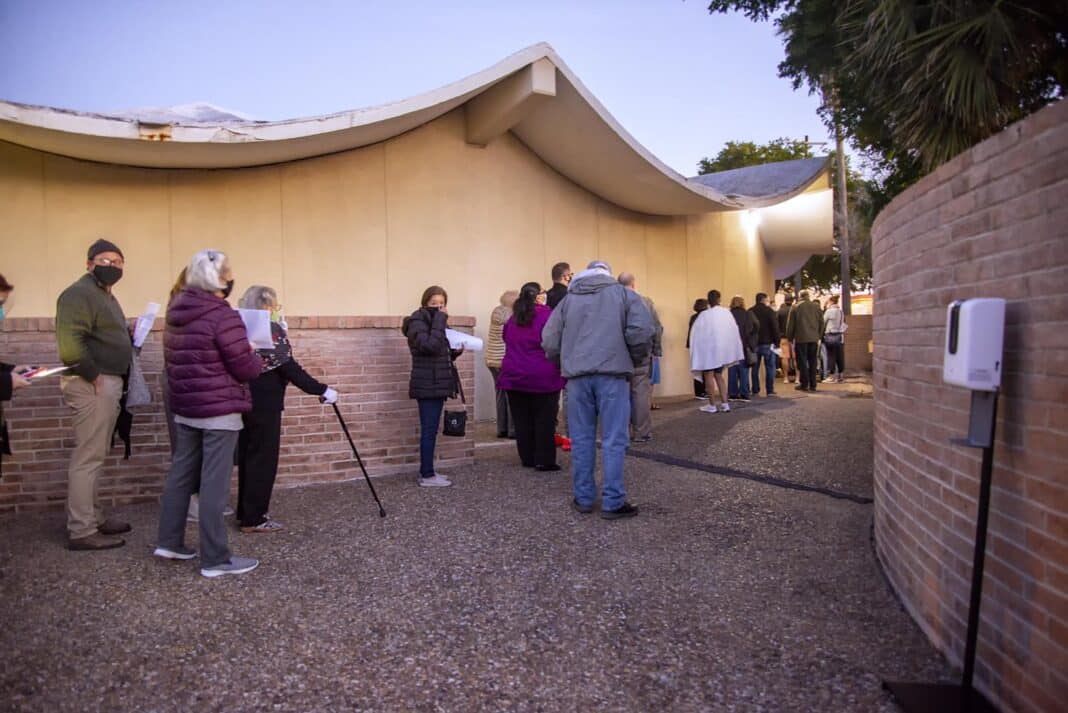HARLINGEN — Soon, 2,000 more Americans will be vaccinated against the coronavirus.
Cameron County health officials are setting up their first community vaccination clinic aimed at administering the COVID-19 vaccine’s second and final dose.
On Jan. 8, health officials administered the Moderna vaccine’s first dose to 2,000 people during a vaccination clinic here.
As part of the vaccination process, the Moderna vaccine requires two doses administered within 28-day intervals, Josh Ramirez, the city’s public health director, said Thursday.
“It’s to help the body recognize the virus to get the immune system to build immunity to fight the virus,” he said, referring to the interval while noting Moderna’s synthetic vaccine doesn’t contain the live virus.
On Feb. 5, officials are planning to give the group the vaccine’s second and final dose at the Casa del Sol community center here.
“My consolation is we’re going to have 2,000 citizens who will have a 94-percent chance of fighting COVID,” Ramirez said, referring to the Moderna vaccine’s 94-percent effectiveness rate. “To us in public health, it’s going to be a great relief.”
Now, health officials are considering the options they’ll take to notify group members of their Feb. 5 appointment along with the clinic’s opening time.
“We’re going to use all avenues available to communicate to our citizens,” he said.
Completing the vaccination process
It’s critical to take the vaccine’s first and second doses to build immunity against COVID-19, Ramirez said.
While the vaccine’s first dose helps the body develop about a 44-percent protection rate against the virus, the second dose gives the vaccine its 94-percent effectiveness rate, he said.
Across the country, some people have failed to show up for the vaccine’s second dose, Ramirez said.
“Some folks have not returned for the second dose and that is concerning because they need the second dose to be 94-percent protected,” he said.
Up to years of immunity
Research is showing the Moderna vaccine can offer up to “years” of immunity against the coronavirus, Ramirez said.
“There’s a lot of information that it can protect from a year to years depending on the person’s immune system — how well your body accepts the vaccine and develops the immunity and start the defense to protect against COVID-19,” he said.
Lessons to learn
Next week, health officials will meet to review aspects of the group’s vaccination process, including whether patients experienced side effects or reactions after receiving their first doses, Ramirez said.
“None have reported to me any side effects,” he said.
As part of the vaccination program, people who received the vaccine’s first dose on Jan. 5 are required to present their vaccination card to receive the second dose, Ramirez said.
“We need to validate that the person has received the vaccine,” he said. “It’s going to be critical that they bring their vaccination card and identification.”
Despite the high number of people who’ll be awaiting their second dose, officials expect a speedier vaccination process, Ramirez said.
“I’m sure the process will be smoother and faster because there’s no paperwork to fill out,” he said.

Building herd immunity
Taking the vaccine’s two doses to complete the vaccination process is vital to building a 70- to 80-percent “herd immunity” within the population, Ramirez said.
While people who receive the vaccine’s first and second doses are expected to develop 94-percent protection against the coronavirus, they could still transit the virus to others, Ramirez said.
“A lot of people call us saying, ‘I got my shot so I can walk around without my mask’ and that’s wrong. They can be 94-percent protected against COVID but they can still be spreaders. If they come in contact with someone who has COVID, they will be 94-percent protected but they can still spread the virus. You’re not contracting yourself but you’re still a carrier.”
Across the country, officials are counting on building herd immunity to loosen federal guidelines aimed at curbing the spread of the virus, including wearing facial coverings, practicing social distancing, avoiding crowds and frequent hand-washing.





